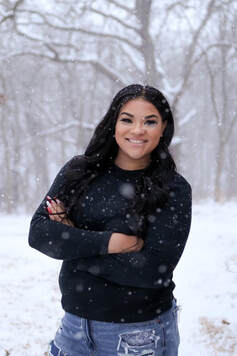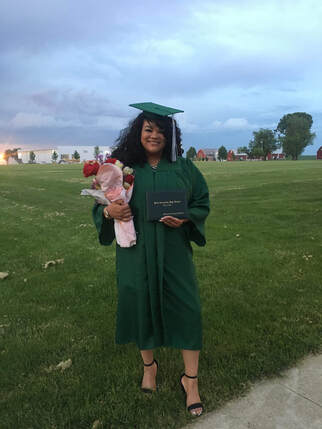Iowans Thrive Blog
Featuring stories, research, and news on Iowa's movement to respond to ACEs
|
|
 At a hearing with Iowa legislators, Brianna (Bri) Deason shared her experiences living in foster care, and how it took her 17 years to find the support she sought throughout her childhood—right as she was aging out of the system. She asked lawmakers to support a bill that would increase the age limit for foster care to 21 and make other policy changes to better support young people in the child welfare system. Although nervous to present, Bri felt power from the experience; the bill was signed into law in May 2022. “I think so many people believe that the system is the way the system is,” Bri said. “I used to believe that, too, but it’s not true. We have the tools and the ability to change the system to do what it needs to do.” While a student at the University of Iowa, Bri has served as a youth development specialist, engaging young people in sharing their experiences with state systems to encourage changes. They’ve pushed for things like having access to better hygiene products while in detention, training social workers and foster families on how to support youth from diverse backgrounds, and paying young people for their expertise in systems-change work. Much of what she and her peers encourage is a healing-centered engagement approach to addressing adverse childhood experiences (ACEs), an approach that fosters collective healing and well-being for young people and adult allies through principles that include having agency to create what you want to see in systems and the community. For Bri, the work “is about creating systems that actually humanize the humans they’re supposed to be working for.” It’s work she’s deeply connected to because of what she experienced throughout her childhood. Growing Up I always knew I was an unwanted child and truly that has never bothered me until the day those words spilled out of my mouth and I saw the horror on everyone’s faces that I realized that maybe that is a bad thing but really who would think I was wanted after everything I went through, as if I wasn’t broken down from the moment I took my first breath which is very ironic if you think about how easily my life could have been ended before it even started - Excerpt from Irony, a poem by Bri Deason Deason recognizes how her mother’s childhood influenced how she treated her children. Deason’s grandfather, a Vietnam veteran, struggled with PTSD and other severe mental health issues and her grandmother had multiple sclerosis. Bri’s mother, the oldest of five siblings, had to care for the others starting at a young age. In her early years, Bri lived with her grandparents while her mother was in prison for a short time. By the time she could walk, she was changing her younger two sisters’ diapers. When the three girls eventually began living with their mother, Bri continued to care for them, getting them ready for school and preparing their meals. Still today, her sisters wish Bri a happy Mother’s Day. In public, Bri and her sisters looked well cared for. They wore $100 Air Jordan shoes to school. They smiled in family photos posted on social media. But privately, they lived in unstable housing, sometimes without electricity or water, as their mother struggled to hold a steady job with only a high school degree. Most of the time, their mother wasn’t around. When she was at home, she often yelled and hit her kids, especially Bri. When child welfare workers showed up to school to check on Bri’s bruises, she would lie to protect her family so she could be there for her siblings. Meanwhile, her depression and anxiety grew worse as she heard often from her mother that she wished Bri would kill herself. You combine already struggling as a teenager on top of someone mentally and physically abusing you every day. When I didn’t kill myself, I think it was only because I was worried that my sisters would find me. I couldn’t do that to them. Eventually, Bri tried to commit suicide. Shortly after, she was placed into foster care due to physical violence by her mother’s boyfriend. By then the family had moved to Iowa from Florida. Bri lived with foster families in rural areas and was often the only Black person at her school. The trauma she’d experienced caused her to distance herself from others, sometimes making her foster parents who wanted to connect with her upset. “I don’t feel like a lot of my foster parents had an understanding of the kind of support I would need or how I would struggle moving into their homes,” Bri said, noting that even simple things, like not having access to Black hair products, made her feel isolated. “Not having a community or not having someone who supported the fact that I was a Black girl, it sucked.” Coping with the trauma After a while in foster care, Bri returned to living with her mother, but she continued to struggle with the impact of persistent traumatic stress. To escape, Bri excelled in school. She worked hard and relished in her teachers’ praise. She read any book she could get, and in high school, she mostly took honors courses. As a teenager, she also learned to fight back. She began to memorize footsteps moving around the house and was always prepared to jump out of bed at night. When one of her social workers didn’t show up to appointments, she talked to the worker’s supervisor and was reassigned. Then came the moment when, during a fight, she hit her mother back. The next day, her mother dropped her off at a homeless shelter where she stayed for a month before being placed into foster care – her last placement until she aged out. With almost no money And support Is very difficult And I can’t blame her For not knowing what to do While all alone Because being alone is the worst Especially when you’re surrounded By people who are supposed to help, So I completely understand And I don’t blame her But I do wish things could be different But that’s the irony. - Excerpt from Irony, by Bri Deason Transformational relationships The process of healing has taken time and continues today. It involves being supported in ways that Dr. Shawn Ginwright identifies as healing-centered engagement, an approach centered on Culture, Agency, Relationships, Meaning, and Aspirations. Transformational relationships, or connections with adults that are authentic, consistent, and positive, have especially been critical for Bri to form a sense of identity and agency. In particular, her Court Appointed Special Advocate (CASA) would talk with Bri about what was going on in her life and what she enjoyed reading instead of dwelling on her experiences with her mother. She allowed Bri to “borrow” books without asking for them back. “That was one of the few times I felt like I was being heard,” Bri said. “That relationship transformed me as a human being.” Feeling unsafe in her foster home during high school, Bri buried herself in schoolwork and two jobs, using the house to sleep. But through a respite program designed to give foster families a break from care, Bri met a couple who invited her over for meals on Sundays. She spent Christmases at their home, and when her foster family asked Bri to leave, the respite family welcomed her to stay until she moved to college. These relationships helped Bri learn how to trust others and to set firm boundaries with other relationships that were unhealthy. It was when I was almost out of the system that I finally had success in finding a healthy environment. It took 17 years for me to get to a place when that early intervention could have happened when I was five, when there first started being instances of abuse.  Finding her path Entering college, Bri planned to become a lawyer and prosecute those who abuse children. Then she thought about how she could help protect those who are being abused. Now, working with youth to engage state systems, she has seen the impact she can make by working on policies and system changes that influence young people’s well-being. “Kayla, [my supervisor], taught me to not be just my experiences, to also be my recommendations, my opinions, my thoughts,” Bri said. “I can also do these things but use my experience.” The state is increasingly engaging young people in conversations with decisionmakers on how to improve the systems meant to serve them. Bri has been able to tell her story in a way that highlights the gaps but also recommends ways of making it better. She especially emphasizes with leaders that engaging youth in systems change is not a privilege to them, but a necessary part of doing the work well. If we have all these systems in place, why are they continuing to not do what they’re designed to do? Where do we need to bridge that gap? We need to listen to the young people who are living these experiences to be like, ‘Okay, this is where they’re telling us these issues are happening. How do we get from there to there? She has been invited to trainings for social workers and other professionals to provide a firsthand account of what it’s like for a young person in the system and has helped plan summits bringing together leaders in child welfare and juvenile justice to learn about improved ways of working with young people and families.
When leaders approach her to say they are working on the changes she’s suggested, she feels encouraged. “I am like, okay, they’re actually listening,” said Bri. “They’re actually hearing us.” Through advocacy, she’s also been able to connect with and celebrate her identity and culture. She especially has found meaning by being involved in the Black Lives Matter movement. At an Iowa City march in 2020, she read a poem for the crowd. “Being a part of that community, and knowing I am just as Black as everyone else, was amazing,” Bri said. Understanding her childhood experiences and how they continue to impact her has been an important part of her healing. Her parents are still in her life today, and these experiences are not where she focuses her attention. It’s on the opportunities for changes that would have helped her. It’s on being a part of a community that is healing together. It’s the hope and excitement she gets from shaping the policies that impact her life. I, too, sing America. My skin painted a darker tone. Hands on their guns, When mine are up. I fail to heed, I will not bow, Finding my strength. - Excerpt from Sing America, Bri Deason Comments are closed.
|
Hi!Here we share what's happening in Iowa to respond to adverse childhood experiences (ACEs). Topics |
|
Connect with us
|
Iowa ACEs 360
501 SW 7th St., Suite G Des Moines, IA 50309 |